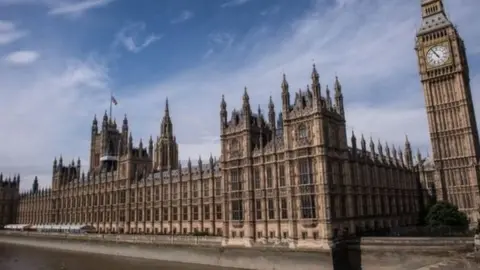DUP MP Paisley faces suspension over Sri Lankan holidays
 Pacemaker
PacemakerThe DUP's Ian Paisley is in danger of being forced to stand down as an MP and face a by-election after being found to have breached parliamentary rules.
The MP faces a 30-day suspension after he failed to declare the details of two family holidays in 2013 paid for by the Sri Lankan government.
The claims first appeared in the Daily Telegraph in September 2017.
Mr Paisley said he accepted the decision but took issue with the Daily Telegraph's "sensationalised report".
He said he would further address the issue in the House of Commons on Thursday.
In a statement, Mr Paisley's solicitor said his client had "apologised unreservedly at the outset for his unintentional failure to register the hospitality he received".
The DUP said it noted the House of Commons Standards Committee's report on Mr Paisley and added that "these matters will now be considered by the party officers".
The sanction could trigger a process at Westminster which could lead to a by-election in North Antrim.
The recommendation to suspend Mr Paisley will now go before the House of Commons for approval, in the form of a motion.
The motion is usually moved by the Leader of the House.
Sinn Féin Foyle MP Elisha McCallion said the DUP must demand the resignation of Mr Paisley, and that it was "an issue of integrity in government and in public office".
Ulster Unionist leader and North Antrim assembly member, Robin Swann, said the findings were "embarrassing for North Antrim" and he "was sure many people there would agree with me that this is not what they expect of their MP".
TUV leader and North Antrim assembly member, Jim Allister, said Mr Paisley should consider his position.
"If any key vote on Brexit is lost because of Ian Paisley's antics, then that will be his shameful legacy for all time," he said.
SDLP assembly member for South Down, Colin McGrath, said Mr Paisley's position was "untenable" and that his party would be seeking a Recall Petition.
"Should this trigger a by-election in North Antrim, Mr Paisley should not challenge the seat again," he added.
Alliance assembly member for south Belfast, Paula Bradshaw, said Mr Paisley had "let both himself and his constituents down" and called on him to consider his position.
 Pacemaker
Pacemaker
Who is Ian Paisley?
Ian Paisley has been the MP for North Antrim since May 2010, and is the youngest child of the former DUP leader of the same name.
Mr Paisley's father, who previously represented the constituency, founded the DUP in 1971 in opposition to what he saw as the increasingly liberal approach of the Ulster Unionists; the party of the political establishment since Northern Ireland was founded in 1921.
In September 2013, it was reported that Mr Paisley had claimed the most expenses of any MP in the year to April.
His combined staffing, travel and accommodation costs were £232,000.
At the time, Mr Paisley said the business expenses "are unavoidable costs that an MP incurs whilst running a busy constituency office and commuting to Parliament" and "none of this money goes to the MP".

Mr Paisley referred himself to the Parliamentary Commissioner for Standards when the allegations first emerged.
The paper claimed Mr Paisley and his family enjoyed two holidays in Sri Lanka in 2013 paid for by the government.
Recall Petition
The Standards Commissioner investigation focused on whether or not the MP breached the rules in respect of the members register of financial interest.
The 30-day ban, if accepted, could trigger a Recall Petition by which an MP can lose their seat if 10% of the eligible electorate in their constituency signs a petition.
But the MP would be free to stand again in the subsequent by-election and it is understood Mr Paisley has indicated he would do so.
 HOC
HOCUnder the Recall of MPs Act, which came into effect in 2016, MPs who are convicted of a criminal offence and jailed, barred from the House of Commons for 10 sitting days or convicted of providing false information on allowance claims can lose their seat if there is a successful petition to recall them.

Previous suspensions
Where an MP is found to have broken the Code of Conduct or committed a contempt, the Committee on Standards may recommend a period of suspension, which leads to a motion in the House.
According to the House of Commons Library, only two MPs since 1949, Teresa Gorman and Keith Vaz, have been suspended for a month following reports from the Standards and Privileges Committee.
Ms Gorman's suspension was in relation to the non-disclosure of property interests. Mr Vaz's suspension was in relation to "serious breaches of the Code of Conduct and a contempt of the House".
Most suspensions after committee reports are much shorter.
Ian Paisley's father was suspended for five sitting days for disorderly conduct in February and November 1981 and again in November 1993.

Rules breached
In her report to the Standards Committee the Standards commissioner found that Mr Paisley breached the House Rules on the following
- on paid advocacy (lobbying in return for reward or consideration) by writing to the Prime Minister on 19 March 2014 to lobby against supporting a UN resolution on Sri Lanka. This amounted to asking for an exclusive benefit for Sri Lanka, when he had received personal benefit and hospitality from the Sri Lankan government within the previous twelve months.
- breached the House's rules on declaration by failing to declare the personal benefit and hospitality from the Sri Lankan government in his letter to the Prime Minister of 19 March 2014.
- breached the House's rules on registration of interests by failing to register within the 28 days agreed by the House the two visits he made to Sri Lanka with family members in March/April 2013 and in July 2013.
After considering the report and "the seriousness of this matter" the Standards Committee recommended "that Mr Paisley be suspended from the service of the House for a period of 30 sitting days starting on 4 September 2018".
They also required that Mr Paisley register the benefits he received from the Sri Lankan government which will be italicised in the register to indicate that they are a late entry.
